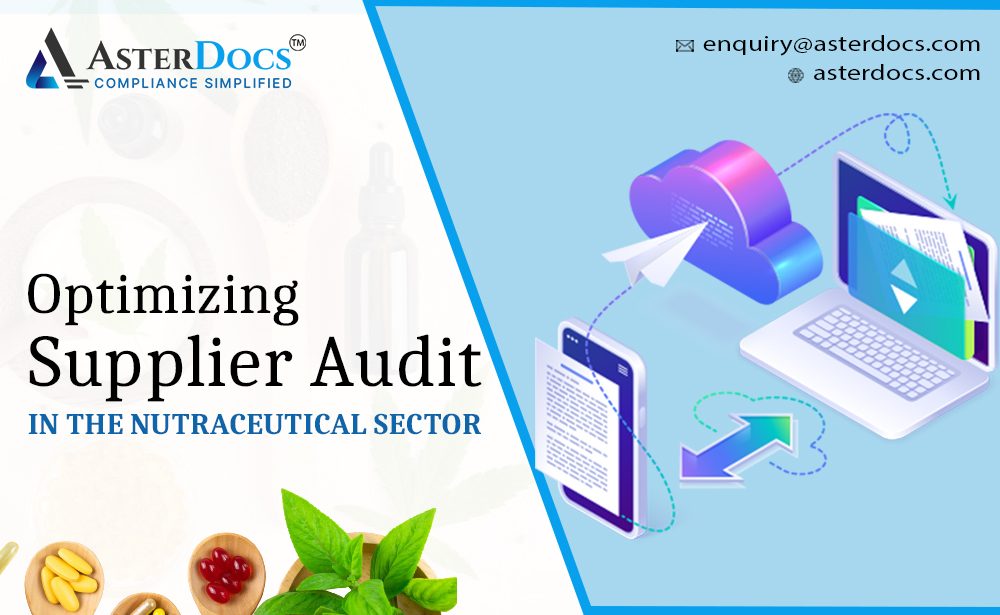Welcome to the world of nutraceuticals, where quality and safety are paramount. In this fast-growing industry, ensuring that your products meet rigorous standards is non-negotiable. That’s where supplier audits come into play.
Supplier audits play a crucial role in maintaining high-quality standards and mitigating risks, but let’s face it, conducting audits can be a daunting task.
In this blog, we’ll dive into the deep waters of supplier audits in the nutraceutical sector, and together, we’ll explore strategies and best practices to optimize these audits. Get ready to revolutionize your supply chain management and achieve compliance with ease.
Understanding the Importance of Supplier Audits in the Nutraceutical Industry
Picture this: You’re a nutraceutical company committed to providing safe and effective products to your customers. But how can you ensure that your suppliers are up to par? That’s where supplier audits step in.
These audits are like a magnifying glass, scrutinizing your suppliers’ practices, processes, and compliance with regulatory requirements.
They help you identify potential risks, ensure quality control, and build a robust supply chain that guarantees safe products for your customers.
Key Challenges in Supplier Audits for Nutraceutical Companies
Supplier audits can be a real test of patience and resources. With complex supply chains, ever-evolving regulations, and limited time and manpower, nutraceutical companies face a unique set of challenges.
But fret not, for these challenges are not insurmountable. Adopting the right strategies and leveraging technology can optimize your supplier audits and streamline your processes.
Preparing for Successful Supplier Audits:
Before embarking on a supplier audit journey, proper preparation is crucial. Start by clearly defining your audit objectives and scope. Understand the specific regulatory requirements and quality standards applicable to your industry.
Develop a comprehensive checklist that covers key areas such as facility cleanliness, personnel training, documentation, and quality control processes. By having a well-defined plan, you can ensure a smooth and effective audit process.
Collaboration and Communication:
Effective communication and collaboration are essential for successful supplier audits. Establish clear lines of communication with your suppliers, ensuring that they understand the purpose and requirements of the audit.
Foster a collaborative relationship by sharing best practices and providing guidance on areas of improvement. Regularly communicate audit findings, recommendations, and corrective actions to drive continuous improvement across your supply chain.
Leveraging Technology for Streamlined Audits:
Gone are the days of manual paperwork and cumbersome spreadsheets. Embrace technology to streamline your supplier audits.
Implement a robust supplier qualification platform, such as AsterDocs that offers automated document management, real-time data tracking, and analytics.
AsterDocs can centralize all audit-related information, making it easily accessible and searchable. It simplifies collecting, organizing, and analyzing data, saving you time and effort.
Risk-based Approach:
Adopting a risk-based approach to supplier audits can significantly enhance their effectiveness. Instead of conducting generic audits for all suppliers, prioritize audits based on risk levels.
Identify high-risk suppliers who are critical in your supply chain and allocate resources accordingly. This targeted approach allows you to focus on areas that pose the greatest risks to product quality and compliance.
Continuous Monitoring and Improvement:
Supplier audits should not be seen as one-time events. To optimize their impact, establish a system of continuous monitoring and improvement. Regularly assess supplier performance, track key performance indicators (KPIs), and identify trends or recurring issues.
Implement corrective actions and preventive measures to address any gaps or non-compliance. By nurturing a culture of continuous improvement, you can proactively address challenges and enhance the overall quality of your supply chain.
Conclusion
Optimizing supplier audits in the nutraceutical sector is essential for ensuring product quality, compliance, and customer safety.
By preparing diligently, fostering collaboration, leveraging technology, adopting a risk-based approach, and striving for continuous improvement, you can transform your supplier audits into a powerful tool for driving excellence in your supply chain.
Remember, supplier audits are not just a regulatory requirement but an opportunity to strengthen your relationships with suppliers and safeguard your brand reputation.
Embrace the challenges, equip yourself with the right tools, and stay committed to delivering top-notch products that meet the highest standards.
Unlock the potential of supplier audits and embark on a journey towards operational excellence in the nutraceutical industry with AsterDocs!
Stay tuned for more insightful articles on supplier qualification and compliance management.













